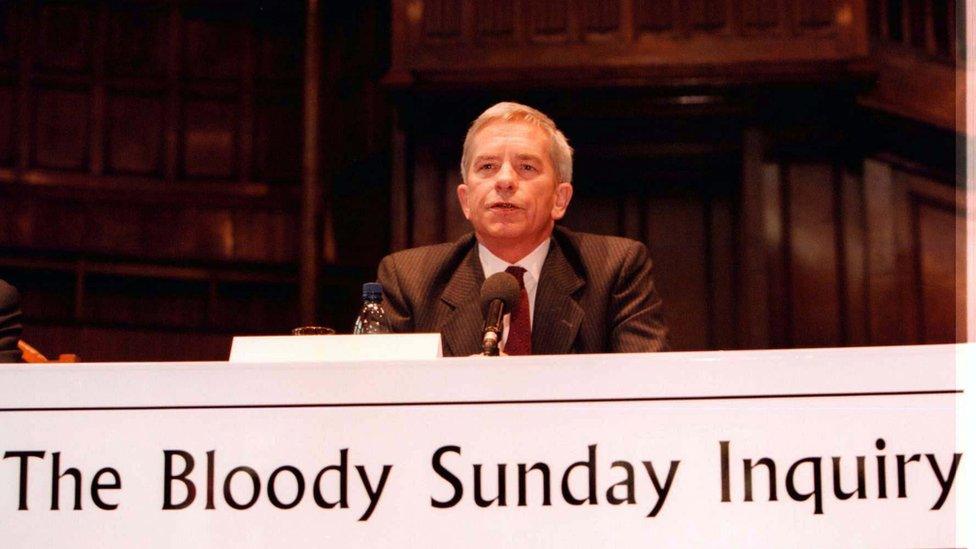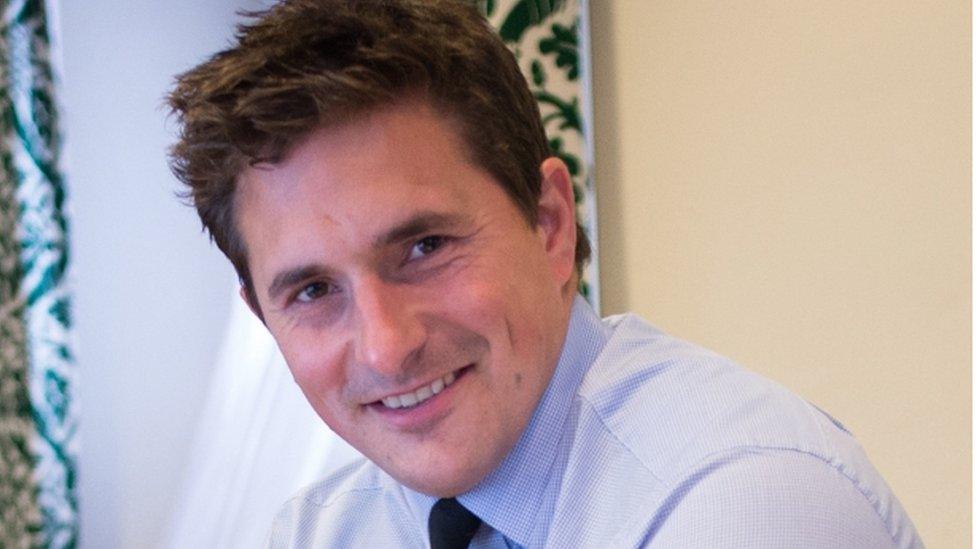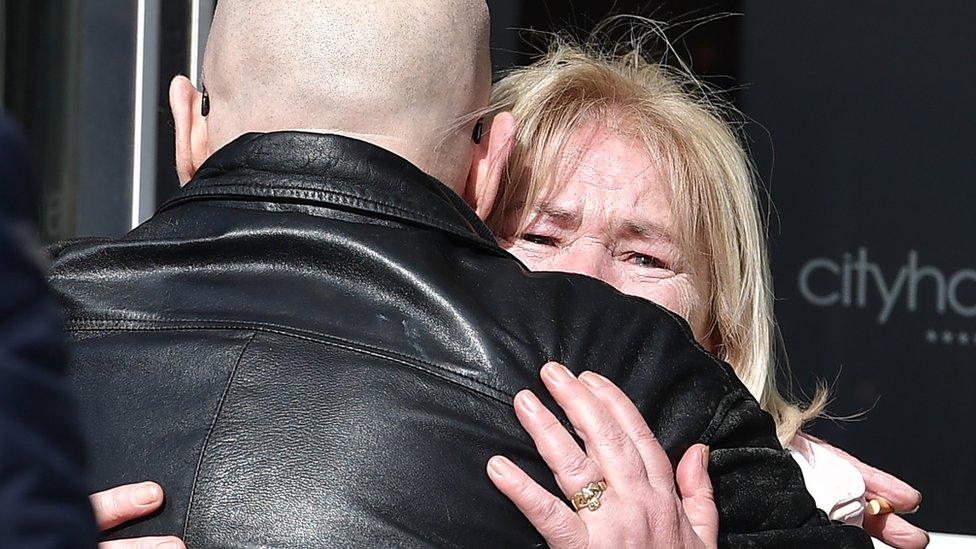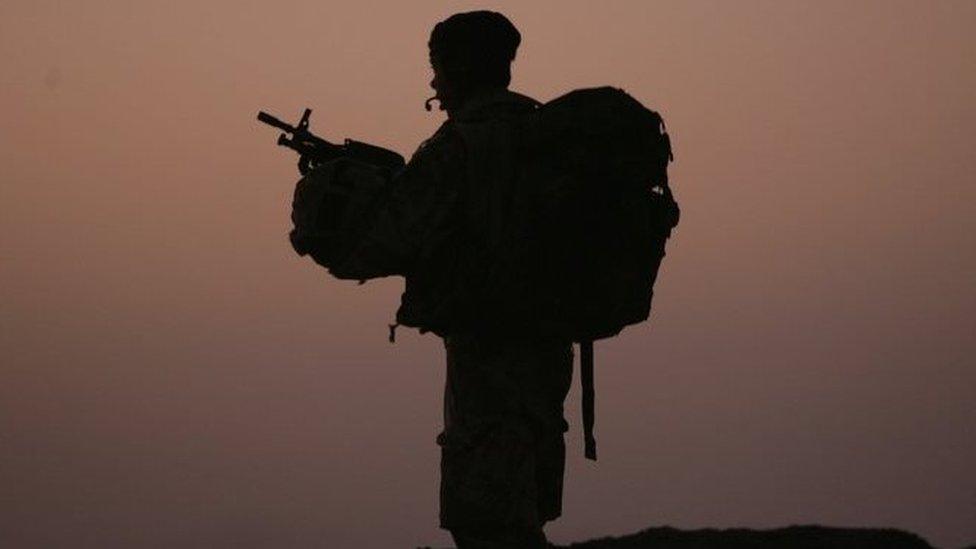Saville warns of 'blanket' Army prosecutions rule injustice
- Published

Lord Saville chaired the Bloody Sunday inquiry, which looked into the events of 30 January 1972
The judge who chaired the Bloody Sunday inquiry has said a blanket rule on Army prosecutions could cause "injustice".
Earlier this week, Defence Secretary Penny Mordaunt said British troops and veterans will be given stronger legal protections against prosecution.
The proposed law would protect soldiers over actions on the battlefield abroad after 10 years, except in "exceptional circumstances".
Lord Saville said cases should be looked at on an individual basis.
The planned protections for veterans, which will be put to a public consultation, would not apply to alleged offences in Northern Ireland.
But Ms Mourdaunt said she hopes they could - at a later date - be extended to apply to Troubles-related incidents.
"It's very important to look at the circumstances of each individual case, very important indeed," Lord Saville said.
'Cause injustice'
"If you try and put a blanket rule in place, you're quite likely to cause injustice, either to the individuals being threatened with prosecution or to those who've suffered loss from the actions of the person concerned."
Lord Saville said if there is strong evidence of wrongdoing, then cases should be brought.
"But then the next question arises - why were they not brought earlier?" he said.
"As time goes by, justice delayed is no justice at all."
Lord Saville said the issue was one for politicians to decide.

Defence Secretary Penny Mordaunt said British troops and veterans will be given stronger legal protections against prosecution
"It's a difficult question and it's a political question, there are very strong views on both sides" he said.
"Those families who lost members through the actions of soldiers can say with considerable justice that the soldiers should face a trial if they appear to have committed a criminal offence.
"On the other side, as the years and indeed the decades go by, it can be said that it's starting to become unfair that soldiers should face such prosecutions so long after the event.
"These are difficult questions, but they're questions that call for a political answer and I'm not a politician."
The defence secretary said she wanted the protection to be extended to troops who had served in Northern Ireland but warned the issue was "not going to be resolved over night".
What protections will soldiers have?
The legislation, which is subject to public consultation, will stipulate that such prosecutions are not in the public interest unless there are "exceptional circumstances", such as if compelling new evidence emerged.
In a statement before her announcement, Ms Mordaunt said: "It is high time that we change the system and provide the right legal protections to make sure the decisions our service personnel take in the battlefield will not lead to repeated or unfair investigations down the line."
What will happen in Northern Ireland?
Ms Mordaunt said that she had secured agreement with Northern Ireland Secretary Karen Bradley that her concerns relating to Northern Ireland would be heard during upcoming discussions on how to deal with the past.
The Northern Ireland Office intends to update political parties on its plan to deal with legacy issues from the Troubles alongside talks on restoring devolution at Stormont.
Working groups will reportedly be established in Belfast and London.
The move follows a public consultation on proposals contained in the 2014 Stormont House Agreement, which ruled out a statute of limitations, or amnesty, for Troubles killings.
The consultation produced about 17,000 responses.
What about ongoing investigations?
Six former soldiers who served in Northern Ireland during the Troubles are facing prosecution.
The cases relate to the killings of two people on Bloody Sunday in Londonderry in January 1972; as well as the deaths in separate incidents of Daniel Hegarty, John Pat Cunningham; Joe McCann and Aidan McAnespie.
Not all of the charges are for murder.
The Public Prosecution Service in Northern Ireland has said that of 26 so-called Troubles legacy cases it has taken decisions on since 2011, 13 related to republicans, eight to loyalists, and five are connected to the Army.
- Published9 May 2019

- Published14 March 2019

- Published3 April 2018
